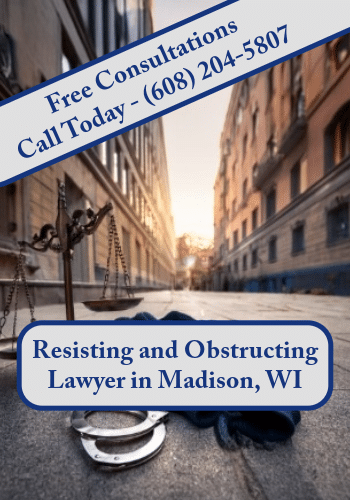Resisting and Obstructing Charge in Wisconsin
- Our Location
Madison, WI
- Free Consultations
(608) 204-5807
Top-Rated Resisting and Obstructing Defense Attorneys
Understanding the Charge: Resisting and Obstructing
In Wisconsin, resisting or obstructing an officer is more than a moment of defiance—it’s a criminal offense with serious implications. Under Wisconsin Statute § 946.41, you can be charged if you knowingly resist or obstruct a law enforcement officer while they are performing their lawful duties. The base offense is a Class A misdemeanor, punishable by:
• Up to 9 months in jail
• A fine up to $10,000
Convictions for resisting or obstructing arrest can also carry long-term consequences on your criminal record, employment, and eligibility for diversion programs.
What Does Resisting or Obstructing Mean Under Wisconsin Law?
For the State to convict someone under § 946.41, it must prove beyond a reasonable doubt that:
1. The defendant knowingly resisted or obstructed an officer.
2. The officer was acting in an official capacity.
3. The officer was performing an act with lawful authority.
These elements are based on Wisconsin Jury Instruction 1765 (Resisting an Officer).
• Resisting typically involves physical interference, such as pulling away during an arrest or refusing to comply with handcuffing.
• Obstructing involves non-physical interference, such as providing false information, delaying an investigation, or interfering with scene security.
If the officer lacked probable cause for arrest or acted outside lawful authority, your actions may not qualify as criminal obstruction or resistance.
Contact Today for a Free Case Evaluation
When Resisting or Obstructing Becomes a Felony
While the default charge is a misdemeanor, the offense can escalate based on the harm caused or false information provided:
Class H Felony –
• If your actions result in substantial bodily harm to an officer (e.g., cuts, bruises, sprains, or soft tissue damage).
• If you provide false information that leads to the wrongful conviction of another person.
Class G Felony –
• If your actions cause great bodily harm to an officer. This includes injuries that create a substantial risk of death or permanent impairment.
These felony classifications bring harsher penalties, including years of imprisonment, large fines, and lifetime consequences.
Defenses Against Resisting or Obstructing an Officer in Wisconsin
At DK Anderson, S.C., we scrutinize every aspect of the encounter and charges. Common defense strategies include:
✔ Challenging Lawful Authority – Was the officer acting outside the scope of their authority or lacking probable cause?
✔ Mistaken Identity or False Accusation – Were you wrongly accused based on confusion or bias?
✔ Lack of Intent – Did you knowingly obstruct or were you confused or startled during the incident?
✔ Unlawful Arrest – An illegal arrest could render any resistance non-criminal.
✔ Violation of Constitutional Rights – Were you unlawfully detained, searched, or questioned without proper legal grounds?
These cases often hinge on bodycam footage, eyewitness testimony, and officer reports. We obtain all available evidence through open records requests to develop a strong defense.
Charged with Resisting or Obstructing in Madison or Southern Wisconsin? We Can Help.
At DK Anderson, S.C., we understand how quickly a misunderstanding can turn into criminal charges. Our firm provides aggressive and informed legal defense in resisting or obstructing cases throughout:
• Dane County (Madison)
• Rock County (Janesville, Beloit)
• Jefferson, Green, Columbia, Iowa and Sauk Counties
📞 Call Today: (608) 204-5807
Frequently Asked Questions - Resisting and Obstructing Charges in Wisconsin
Resisting involves physical actions against law enforcement (pulling away, refusing handcuffing). Obstructing involves non-physical actions, like lying to officers or delaying an investigation.
Possibly not. The State must prove you knew or should have known the person was an officer performing official duties.
If the arrest was unlawful, and the officer lacked probable cause, your resistance may not be criminal under Wisconsin law.
Yes. Even a misdemeanor conviction can impact employment, housing, gun ownership rights, and immigration status.
Yes, especially if the officer’s actions were questionable or if a diversion agreement is reached. Having an attorney improves your chances of a favorable outcome.
Our Practice Areas
Drunk Driving
Whether you are charged with a first offense, or a fifth offense, our Wisconsin OWI attorneys can help.
Violent Crimes
A conviction for any one of Wisconsin's violent crimes will have significant consequences.
Drug Charges
Our Wisconsin Drug charge attorneys know the law and how to apply that law in the court room.
Domestic Violence
A conviction for a domestic violence charge in Wisconsin has additional consequences.
Property Crimes
Wisconsin property crimes include theft, forgery, and criminal damage to property.
Sex Offenses
Not much will change your life like a conviction for one of Wisconsin's sex offense charges.
Traffic Citations
Although less serious than a criminal charge, a traffic citation can effect your driver's license.






